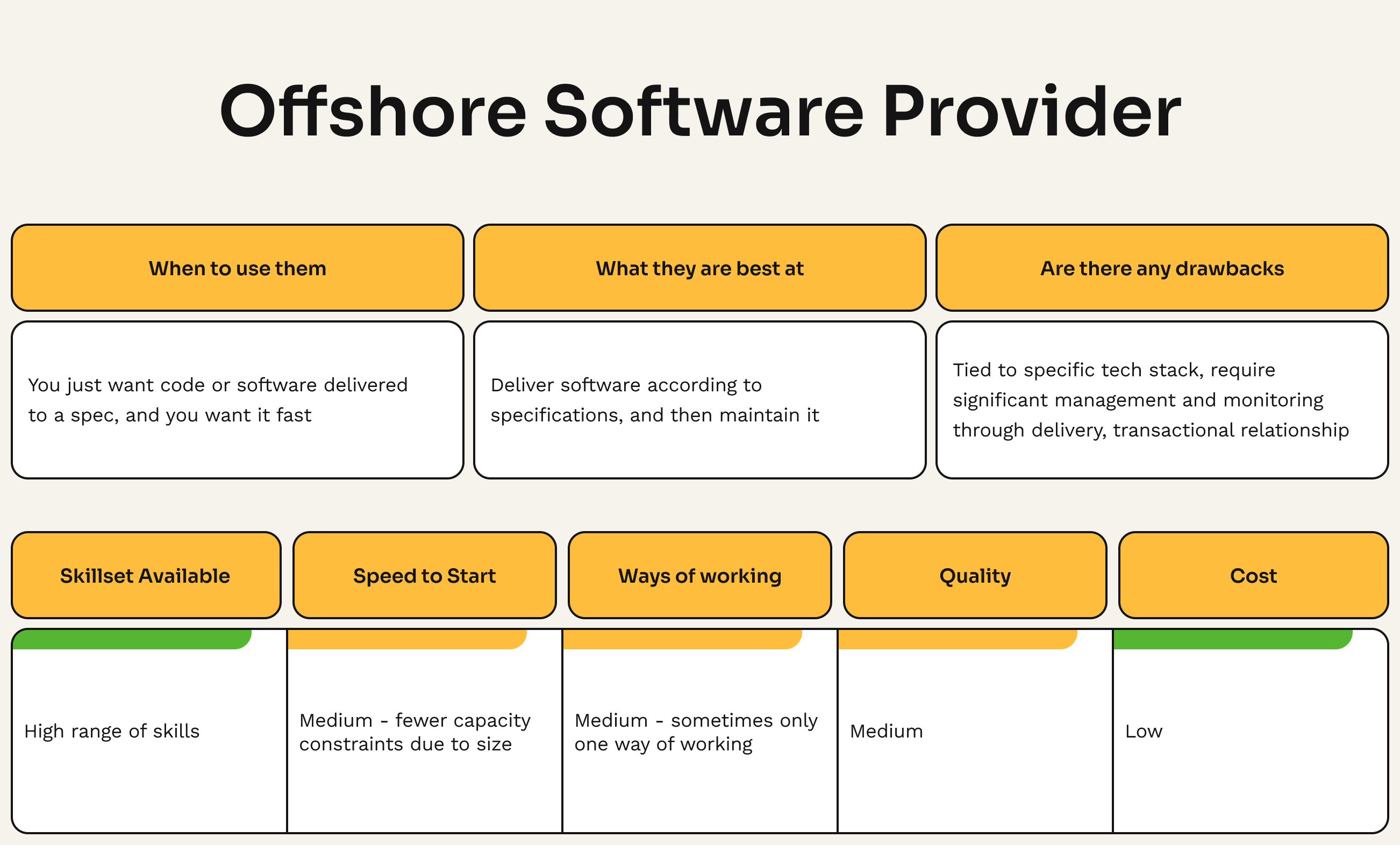Selecting the right partner to augment your capacity or lend additional support in delivering your roadmap demands a thoughtful assessment of various factors. Beyond the timeline, complexity, your available tech stack, and the ever-present fiscal constraints, there's an undeniable risk factor to consider. The nightmare of missed deadlines, a project left in disarray, or an unfulfilled promise of delivery, looms ominously, making the decision process even more nerve-wracking.
The marketplace is saturated with agencies and consultancies, each pledging rapid project realisation. They present a spectrum of support levels, ranging from immediate solutions to comprehensive strategic interventions that permeate your entire business operations. Deciphering through this abundance of options can further complicate the decision-making process.
However, if your project is anchored in a compelling creative or commercial concept, and it surpasses the capacity of your internal team or a handful of freelancers, a software development company could be a strong contender.
Off-shore and near-shore software firms have their distinct advantages. This post will outline the benefits and drawbacks, the commendable and the contentious, to help you evaluate if a software development company could indeed be your ideal match.
To deepen your understanding about potential development partners, don’t forget to peruse our series of guides and at-a-glance overview.

Talent Pool and Expertise: The Mixed Bag
PROS: Advantages of Skill Diversity
It may sound somewhat trite, but software development companies specialise in software development and implementation. This often means more than just code however. A good software company might also offer additional services, such as UI or UX design, a measure of strategic consultancy, and post-launch maintenance for your project or knowledge transfer.
They’ll also have a reasonably broad range of skills available on their bench, and will usually be experts in a chosen technology stack, so if that matches your own setup, you’ll know you are in safe, experienced hands, with a deep level of technical knowledge.
Finally, team sizes are usually larger than that offered by agencies - particularly when working with off-shore companies - so there might be more opportunity for individuals that can integrate with your team or whole teams that can take on projects.
CONS: Potential Challenges in Skillsets
It’s worth mentioning that while their tech stack prowess has its merits, it could also set the stage for potential hiccups.
Being tied to a specific set of frameworks, ways of working, languages or cloud/on premise solutions means it can be difficult to find a software development company that can integrate easily into your own digital ecosystem. Though not an insurmountable hurdle, this quest could be time consuming at the outset of your project.
The calibre of code produced by an off-shore or near-shore development firm can also vary quite a bit. This isn’t to say that top quality work isn’t available, only that you will need to vet the company properly and check out previous examples of their work to verify the finished project fits your requirements.
Particularly with off-shore businesses, you’ll typically be able to access a larger pool of talent, but this often will require a lot of management input on your part, due to lack of visibility additional effort may be needed to track progress and monitor work. Near-shore businesses may have an advantage here, as their working hours will more closely match your own. Unfortunately, this often comes at a higher cost, so depending on business needs you might be keen to prioritise one over the other. That said, cheaper isn’t always the best.
Further complicating matters, the senior devs you meet in the project discussions might not be part of the actual project team once they get started. Again, this isn’t always the case, but it can mean you’ll spend significantly more time managing the team throughout your project, or you might find the coding skills available don’t meet your expectations.
Quick Deployment: The Race Against Time
PROS: Advantages of Quick Deployment
In comparison to agencies or consultancies, software development firms wield considerably more developer power. This typically enables them to hit the ground running.
Development companies tend to have tried and tested operational processes in place. By finding companies who favour the same development methodologies - waterfall, agile, scrum, extreme programming, etc - they will be easier to deploy and integrate within your team and environment. This paves the way for a swift journey to the finish line.
CONS: Hitting the Brakes: Potential Speed Bumps
While the velocity at which software development firms operate is commendable, the actual time spent working doesn’t capture the full scope of a digital project.
As touched upon earlier, if you’re working with an off-shore development team, you'll have to carve out a hefty chunk of time for managing and monitoring progress. Your rapport with this type of company can also tend to be largely transactional due to the time differences. While this could be a boon for projects with finite parameters and tight deadlines, it could also impinge on the firm's responsiveness. To avoid stress, it’s perhaps easiest to imagine that you’re managing a new team for the duration of the project - one that isn’t familiar with your own preferred ways of working.
Near-shore companies will have an edge here, as their teams will usually be geographically closer to your own, allowing for greater overlap in working hours, and facilitating quicker responsiveness. In addition, while development is certainly an international industry and it’s by no means certain, near-shore businesses may have more native language speakers on their teams, which could also assist collaboration.
Operational Flexibility: The Tightrope Walk
PROS: Flexibility Perks in Software Development
As we mentioned earlier, a software development company will likely have robust project management frameworks in place and a familiarity with a broad array of popular project blueprints. The company’s focus will be on delivering software that matches your specifications, so they will actively look for ways to reach that goal quickly and efficiently. If you need working code in a short time, this can be where software development companies shine.
CONS: Rigid Roads: The Flexibility Hurdles
Regrettably, cultural fit and adaptable ways of operating aren't typically software companies' strong suits.
With off-shore you could be dealing with development teams scattered across different time zones. Both models also mean that unlike your own team, your ability to screen for cultural compatibility on an individual level may be limited.
Conflicts are not unheard of, and while not catastrophic, they could fuel frustrations if clear communication is a hurdle, or if integrating work done by your team with the company's output proves challenging.
In addition, amends or project scope changes can be hard to incorporate once a project is in full swing, so be sure to iron out all planning aspects beforehand.
Finally, remember that the processes a software development company uses to keep projects on track are usually set in stone, so brace yourself for a single way of operating that might not accommodate your personal preferences.
Cost Effectiveness: The Balancing Act
PROS: Money Matters: The Financial Upsides
Finally, let’s consider the bottom line. Software development firms typically operate at a lower price point. Their lean overheads and outsourcing model mean you'll only be shelling out for what you need, without the push to purchase additional services that you may encounter with other partners.
Most software companies will offer a mix of pricing options, with time-based models for ongoing projects, or a set price for project completion, so they can be a great option if you need to keep costs under tight control.
It’s worth noting that time-based pricing would be more common if your project isn’t fully defined, or if the project is particularly large, but might be best reserved for a company you have worked with in the past.
CONS: The Hidden Price Tag: The Financial Pitfalls
On the flip side, it’s important to consider the true cost of delivery. While your initial outlay might be modest - and you're certainly economising compared to ramping up your in-house resources - a software development firm may expect you to shoulder the entire project management burden. Your management overhead could be much larger compared to other options, so it's worth considering whether your time could be better spent elsewhere.
Overall, off-shore firms will usually be your lowest-cost option, but this can be a false economy, with increased risks associated with overall quality of the work, and increased friction points in your communications process.
Plus don't forget to factor in post-launch or maintenance services for your product as these will be additional costs.
Conclusion
Near-shore and off-shore software development companies certainly offer their share of advantages. They come in at a low initial cost and are skilled at executing coding projects swiftly. If you're in need of an MVP or additional hands, they could be your go-to solution.
However, you'll be solely responsible for project management, and the end product's quality can be inconsistent. You'll also need to scout for a firm that aligns with your tech stack and be prepared for the fact that the firm will have its unique approach to executing projects, which may not gel with yours. If these elements make you uneasy - or if your plate is already overflowing - then you might find more value in partnering with an agency or a serviced marketplace.
We've assembled a comprehensive overview of different options to help you pinpoint the optimal choice for your development project, along with deep dives into the various types of partners on the market. If you have a project brewing and are on the lookout for additional support, we'd be thrilled to hear from you.
